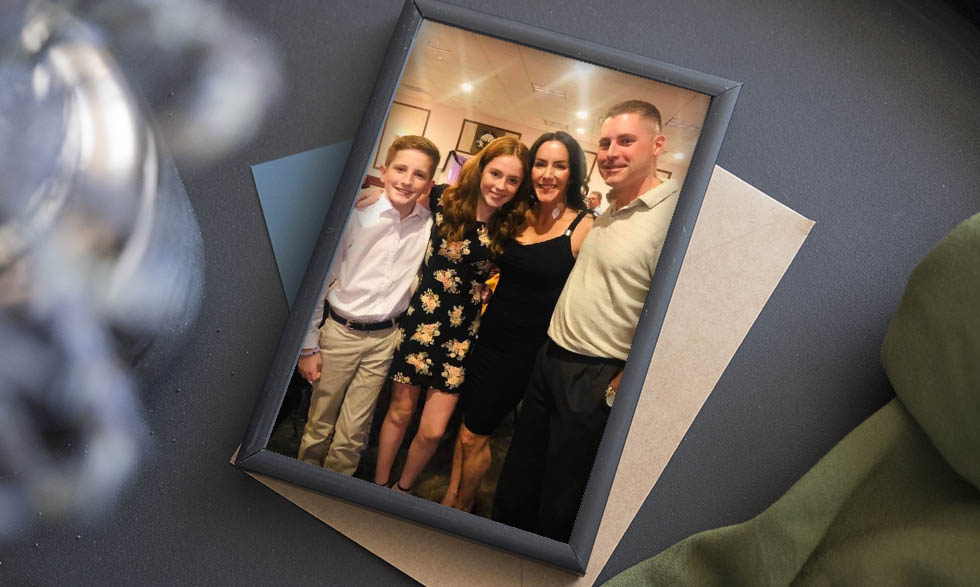
Last updated on August 6th, 2024 at 02:09 pm
Judy Congdon is fair skinned, light eyed, and freckles easily. Those qualities alone are risk factors for many types of skin cancer. Years ago, as Judy studied for her firefighter lieutenant exam with her two then-young children, she worked at a tanning salon where she could tan for free. She also has a genetic predisposition—or risk—toward the disease. Two of her grandparents had melanoma, a serious form of skin cancer.
Judy went to her dermatologist seven years ago following some concerns with rough, scaly skin spots. However, she didn’t follow up on care. Like so many other things, life got in the way. Along with taking care of her family, she was recovering from an on-the-job accident. It required years of physical therapy, many operations, and forced her to retire early from the fire department.
Now 45, Judy has been diagnosed with Bowen’s disease. Bowen’s disease is a form of skin cancer that includes squamous cell carcinoma and actinic keratosis. She has had to go through a topical, or on-the-skin, chemotherapy treatment to essentially “burn off” the cancerous skin patches. The process has been painful, creating itchy scabs all over her face that slowly fall off. It will take months for it to heal, and in the meantime, Judy experiences consistent nausea and fatigue from the treatment.
She shared lessons learned from her journey and how she’s working to prepare the next generation to be sun safe.
How did you start to notice your most recent cancerous spots?
A friend of mine had noticed. We were out to dinner, and she’s like, “You keep scratching your forehead.” And it was the same spot that my hairdresser had pointed out earlier.
So, I was scratching the top of my forehead, and the temple on the opposite side, which were the two (cancerous) spots that were visual, anyway. But it was different from when it was seven years ago. They were constantly scaly. No matter how much moisturizer I put on, no matter how hydrated I felt, those spots were scaling and always dry.
What was your idea of skin cancer before your diagnosis, or before you even started going to the dermatologist regularly?
So, I’m kind of one of those people, I feel like I’m untouchable. Even with all the surgeries I’ve gone through, I feel like I’m invincible. My maternal grandmother had melanoma, my paternal grandfather had melanoma, and I lost a friend a few years ago from melanoma. And you’d think, even losing a friend, that I would have gotten checked, and I didn’t. So, while I knew that it was real, because I watched somebody die from it, I didn’t take it seriously enough.
What have you learned about getting a yearly skin check though your experience?
I wish that more people would get checked annually. I wish I knew that earlier, just because I didn’t see it, didn’t mean it wasn’t there. And that’s why it’s so important to get checked. So that’s kind of what I wish people would absorb from my story, that because you don’t see it, it doesn’t mean it’s not there. If you suspect skin cancer, get to your doctor. Go to the dermatologist. Go to a professional and get checked regularly if you are predisposed to skin cancer.
What have you learned about personal health from this experience?
If you are proactive with your own body and your own health, you can prevent things like what I’m going through right now. This was preventable. I just didn’t focus on myself. The dermatologist always got pushed off, because I wasn’t focusing on my body as a whole. I was only focusing on what I was going through at a given time.
Do you have advice specifically for other parents?
My daughter is a redhead with freckles, and she’s going to be getting her skin checked every year (having red hair and freckles can put some people at risk of basal cell cancer, another form of skin cancer). I’m going to start her now while she’s 15. She realizes how important this is. My kids watching me go through this, they don’t want to ever go through this. I just think it’s important for moms and dads out there to get their kids checked because it’s never too early.
What’s your current daily plan for staying sun safe, especially as you heal?
It’s literally just sunscreen, sunscreen, sunscreen, and big hats when you’re out in the sun.
My girlfriend and I still go walking outside. But we like to do it late in the evening so I’m not outside between 10 and 4. I try to avoid those times regardless of whether it’s cloudy out or not because the UV rays are still there.
You’ve shared images of your treatment on social media to help others. What has the response been like for them and you?
With awareness, you have to kind of humble yourself, share your story to help out others, which is why I have no problem sharing pictures of my face like this.
I find it very therapeutic to share my story to help others. Even if that just means one person goes and gets checked. Since I put up a post a month ago, I know four people who have already made dermatologist appointments and gotten checked. I feel empowered that I helped somebody else. And I would hope that somebody would read this article and be like, “Wow, I don’t ever want to go through that, so I’m going to make an appointment.
Editor’s note: The best protection against all types of skin cancer is protection from UV rays with sunscreen, sun-protective clothing, and avoidance of tanning beds.
